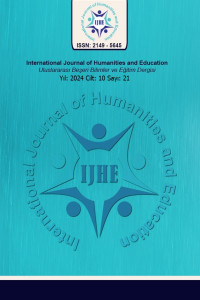Abstract
The Nâd-ı Ali prayer, which translates to ‘call to Ali’, occupies a central position within the cultural and religious practices of the Alevi-Bektashi tradition. The prayer, revered for its efficacy in seeking assistance during challenging circumstances and purported to harbor manifold benefits, is traditionally attributed to Gabriel’s instruction to the Prophet Muhammad amidst the adversities encountered during the Battle of Uhud. The manuscript, which is the subject of this paper, is a composition in Chagatai Turkish, elucidating the virtues and significance of the Nâd-ı Ali prayer recited within Alevi-Bektashi communities.
This particular manuscript, archived in the Bodleian Library at Oxford University (MS. Ind. Inst. Pers. 122), comprises six folios appended to the end of a manuscript containing two Persian texts. There exists no attribution regarding the signature entry or author. There are 15 lines in the folios numbered 1a, 1b, 2a, 2b, 5a, 6a and 6b, and 14 lines in the other folios. The text lacks any vowel points. While the text expounds upon the merits associated with the practice of reciting the Nâd-ı Ali prayer, it notably lacks the inclusion of the original Arabic prayer or its translation. This paper endeavors to elucidate the significance of Nâd-ı Ali, presenting both the translation of the text and its transcription into Modern Turkish, while also examining linguistic disparities from Chagatai Turkish.
This paper aims to contribute to the studies on Chagatai Turkish, considering that each new text published will contribute to the Turkish language studies and solve some linguistic aspects that have not yet been clarified.
Keywords
References
- Argunşah, M. (2017). Çağatay Türkçesi. İstanbul: Kesit.
- Eckmann, J. (2021). Çağatayca el kitabı. (çev. G. Karaağaç) Ankara: Türk Dil Kurumu..
- Kaymaz, Z. (2007). Çağatay Türkçesinde isim hal eklerinin birbiri yerine kullanımı. II. Uluslararası Büyük Türk Dili Kurultayı: İhsan Doğamacı'ya Armağan (s. 350-354). Ankara: Türk Dil Kurumu.
- Sarıkaya, M. S. (1998). Bektâşî-Alevîlerde bir dua: Nâdı Ali. Süleyman Demirel Üniversitesi İlâhiyat Fakültesi Dergisi (5), 17-31.
- Yıldırım, R. (2018). Geleneksel Alevilik. İstanbul: İletişim
Abstract
"Ali'ye çağrı" anlamına gelen Nâd-ı Ali duası Alevi-Bektaşi geleneğinde önemli bir yere sahiptir. Müşkül durumda yardım istemek için okunan ve pek çok yararı olduğuna inanılan duanın Uhud Savaşı sırasında zor durumda kalan Hz. Muhammed'e, Cebrail tarafından öğretildiğine inanılır. Çalışmaya konu olan eserin ilk satırından bunun Alevi-Bektaşi zümrelerinde okunan Nâd-ı Ali duasının faziletlerini anlatan Çağatay Türkçesi bir metin olduğu anlaşılmaktadır.
Oxford Üniversitesi, Bodleian Kütüphanesi, (MS. Ind. Inst. Pers. 122) katalog kaydıyla bulunan eser, iki Farsça metnin de yer aldığı bir mecmuanın son kısmında bulunan altı varaktan oluşmaktadır. Ketebe kaydı ve müellif/müstensih ile ilgili herhangi bir bilgi yoktur. 1a, 1b, 2a, 2b, 5a, 6a ve 6b numaralı varaklarda 15; diğer varaklarda 14 satır bulunmaktadır. Metin harekesizdir. Nâd-ı Ali duasını okumanın yararlarının anlatıldığı eserde duanın Arapçası ya da tercümesi yer almamaktadır. Çalışmada Nâd-ı Ali ile ilgili bilgi verildikten sonra metnin çeviri yazısı ve Türkiye Türkçesine aktarımı yapılarak Çağatay Türkçesiyle farklılık gösteren dil hususiyetleri incelenmiştir.
Neşredilen her yeni metnin Türk dili çalışmalarına katkı sunarak henüz aydınlatılmamış olan bazı dil hususiyetlerini çözüme kavuşturacağı düşünülerek yapılan bu çalışmanın Çağatay Türkçesi ile ilgili çalışmalara fayda sağlaması amaçlanmaktadır.
Keywords
References
- Argunşah, M. (2017). Çağatay Türkçesi. İstanbul: Kesit.
- Eckmann, J. (2021). Çağatayca el kitabı. (çev. G. Karaağaç) Ankara: Türk Dil Kurumu..
- Kaymaz, Z. (2007). Çağatay Türkçesinde isim hal eklerinin birbiri yerine kullanımı. II. Uluslararası Büyük Türk Dili Kurultayı: İhsan Doğamacı'ya Armağan (s. 350-354). Ankara: Türk Dil Kurumu.
- Sarıkaya, M. S. (1998). Bektâşî-Alevîlerde bir dua: Nâdı Ali. Süleyman Demirel Üniversitesi İlâhiyat Fakültesi Dergisi (5), 17-31.
- Yıldırım, R. (2018). Geleneksel Alevilik. İstanbul: İletişim
Details
| Primary Language | Turkish |
|---|---|
| Subjects | Language Studies (Other) |
| Journal Section | Research Article |
| Authors | |
| Publication Date | April 30, 2024 |
| Submission Date | April 8, 2024 |
| Acceptance Date | April 29, 2024 |
| Published in Issue | Year 2024 Volume: 10 Issue: 21 |
International Journal of Humanities and Education (IJHE)
This work is licensed under a Creative Commons Attribution-NonCommercial-No Derivatives 4.0 (CC BY-NC-ND 4.0) International License.


